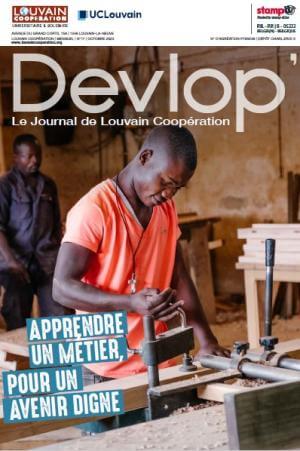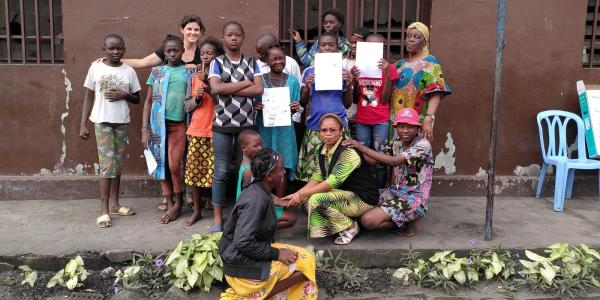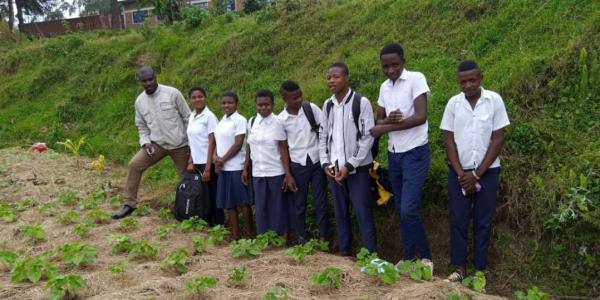
Edito
Pour que les jeunes entraînent un réel changement
Les jeunes représentent un atout indéniable pour le développement durable de leur pays. Cependant, ils accèdent très difficilement à l’emploi, et le chômage touche tout particulièrement les jeunes femmes, qui occupent les statuts les plus précaires (emplois vulnérables et travail indécent), favorisant encore les inégalités et un risque de rupture sociale.
De plus en plus, les États s’efforcent de trouver des solutions pour assurer une meilleure adéquation entre la formation et le marché du travail et ainsi réduire la pauvreté et l’exclusion sociale. Mais les différentes régions peinent à développer leur potentiel économique et l’éducation reste souvent inadaptée aux besoins.
Aider la jeunesse à développer ses aptitudes pour accéder à une situation professionnelle et sociale stable est un enjeu fondamental pour rompre avec le cycle infernal de la pauvreté et contribuer à la construction d’une société plus égalitaire. Par l’insertion socioprofessionnelle, Louvain Coopération entend permettre à ces jeunes hommes et femmes d’acquérir leur autonomie, mais au-delà, un statut, une place au sein de la société.
Pour cela, d’innombrables déterminants interviennent : les compétences techniques sont importantes mais les compétences relationnelles (socio-émotionnelles) jouent un rôle fondamental. Ces facteurs dépendent beaucoup du milieu familial, du genre, de la classe sociale, des origines géographiques, ethniques ou religieuses, ou encore du handicap.
Dans chacune de nos zones d’intervention, avec nos partenaires, nous analysons donc en profondeur ce contexte (y compris conjoncturel et économique) pour adapter l’accompagnement des jeunes vers l’insertion sociale et professionnelle, et assurer que leurs compétences soient utilisées et orientées vers la voie qui leur correspond le mieux.
Les jeunes sont les acteurs centraux de leur démarche d'insertion et notre objectif est de mettre tout en oeuvre pour valoriser leurs compétences personnelles, les encourager à croire en leur potentiel et à se lancer dans le monde professionnel, pour qu’au final, ils entraînent un réel changement au sein de leurs sociétés.
Since 2015, Louvain Coopération has been working with its local partners to support street children in the DRC. The aim: to support, but also to offer a future to these young people who have already suffered far too much.
In 2015, Louvain Coopération set up its first support and guidance project for street children, focusing on a psychosocial approach. Thanks to the work of partner reception centres, the children are initially welcomed, housed, fed and cared for... Work then begins with psychologists and street educators to try to alleviate the suffering linked to all the traumas they have already endured and to gradually reintegrate them into society.
A focus on the future
In eight years, this project has come a long way. In 2018, it was extended to South Kivu, with a reception centre in Bukavu. A mobile rescue team has also been set up in Kinshasa, scouring the streets of the capital in search of children in distress.
Between 2016 and 2021, in the province of South Kivu, 600 vulnerable children and orphans were supported to finance their minerval fees and thus complete their primary or secondary education. Subsequently, less than 5% of these young people went on to university, and most of those who obtained an official state diploma are unemployed. On the other hand, some of these young people went on to vocational training and received a socio-professional integration kit to help them get started. The kit includes tools, advice and support in developing their small businesses. These young people have set up cutting and sewing workshops, and developed small businesses in car mechanics, masonry, joinery, etc.
Focusing on agricultural entrepreneurship
On the strength of this experience, Louvain Coopération has decided, for its 2022-2026 programme in South Kivu, to invest more in technical training for young people and to target agricultural technical schools in particular, "because agriculture is the main activity in this rural area, with a lot of potential, but the agricultural section is less well attended and the needs of these schools are great", explains Olivier Matumaini, Sustainable Food Systems Project Manager for Louvain Coopération in the DRC. "Young people back home aren't very attracted to farming, because for them it's dirty work that pays less and isn't highly valued. So we felt it was important to support this sector to change things. "
Thanks to financial support from the Belgian government, the Aflam foundation and Lotus Bakeries, Louvain Coopération is supporting 4 technical high schools, which teach 486 students in agricultural techniques. In practical terms, the main aim is to strengthen the practical aspect of these courses. "We are helping to improve their demonstration units by financing most of what they lack. For example, we have rehabilitated a hutch for raising rabbits at the Muku school, bought a boar for the piggery at the Cihérano school, trained pupils to set up a macro-propagator for healthy banana shoots, ... We have also set up management committees for the demonstration units," Olivier Matumaini details.
"We are also offering training courses for teachers and school managers to help them develop a continuing education plan". Exchange visits between schools and to agricultural businesses in the region are being organised, and a business plan competition is also planned for young graduates. The project with the greatest potential is part-funded. At the end of the training course, graduates who launch an IGA (income-generating activity) in the field of the circular economy and/or agro-ecology, for example market gardening, domestic livestock rearing, small trade, crafts or other, are monitored and supported by our teams as micro-entrepreneurs. The aim is to support the development of their initiatives, but also to analyse which training courses are the most promising in terms of socio-professional integration.
Alexandra Bataille, an educator specialising in working with young people living on the streets, is studying clinical psychology at the University of Paris. She completed her Masters placement in Kinshasa, working on our project, and more specifically in the reception centres for girls. She talks to us about this experience.
LC: How would you describe the psychological state of the young people you met?
These children have all, to a greater or lesser degree, experienced trauma. Most of them have been accused of being child witches and entrusted to churches that have often tortured them in order to exorcise them. Many were abused by their families, rejected and abandoned. They have spent time on the streets, where they have suffered numerous assaults and acts of violence. So when they arrive at the centres, they are very much affected by all that.
LC: How do you support them?LC: How do you support them?
First of all, we have to welcome them and gradually help them to (re)build a positive self-image, because this is very low. We try to reduce their level of suffering so that they feel better about themselves and about others, and so that they can look forward to a present and a future. This happens on an individual level, by working on their history and experiences, but also on a group level by learning to live in a group, in society. In the street, children have developed human relationships based on abuse and the use of force. Very early on, they had to take responsibility for themselves in order to survive, so they have to (re)learn to be children. In the centres, the educational and psychosocial care provided aims to do just that: enable them to take their place. They can eat, sleep, play, go to school, be looked after... in short, be children. This work also involves supporting the socio-educational teams to reduce their stress and strengthen their skills, enabling them to offer care that is better tailored to the children's needs.
.LC: Socio-professional integration also plays an important role in the psychological reconstruction of these children? Clearly. It's fundamental, in fact, because some of these children have no solution. They don't want to or can't return to their families because they've been abused or driven away, and they don't want to go back to the streets. So they need another option. And that means training, a trade to help them reintegrate. I think it would also be useful to develop specific centres for older young people who are in training, to support them until they have their own home, their own salary... It's vital to support them in this project, otherwise the upstream work risks coming to nothing. Psychosocial care loses its meaning without an integration project that offers a possible future. But if they are trained, they have a chance of real and lasting reintegration. LC: How are the overall problems of street children in Kinshasa evolving today?
« It's important to train young people in this field, because we live in an agropastoral region with great potential for livestock farming and agriculture. Today, many young people have nothing to do, they can't find work, and sensible farming can provide them with an income. This training is an asset for a better future. Over the years, it has attracted more and more young people, because we try to make them understand that first and foremost, you have to eat, and that you can't live without agriculture and livestock farming. Previously, our training courses were very much focused on theory, but with the support of our partners, we have developed practical learning. Young people are much more interested because they learn in class and can then apply these theories in the fields. The pupils also receive courses in entrepreneurship, which prepare them to take charge of their own affairs through livestock rearing and other activities.
In the future, we want to turn the school into a production and learning unit where farmers and young people come to learn farming techniques. This would be a source of self-financing for the school and a plus for the households around the school, as they would be able to improve their farming techniques and productivity.
Generally speaking, we are putting the emphasis on sustainable agriculture because for years we have contributed to the destruction of our ecosystems and our environment with our farming practices. It is important to teach young people about agriculture that preserves their environment. With this approach, we are improving production while helping to safeguard the environment."
Recevoir
la version complète
du journal Devlop'
News / Vidéos - En savoir plus ...



